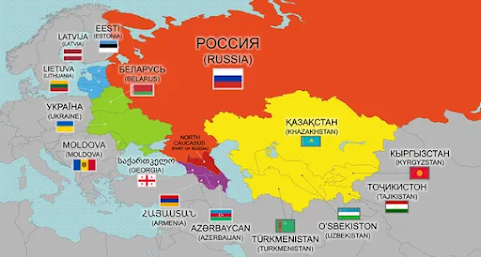The Soviet Union, officially known as the Union of Soviet Socialist Republics (USSR), emerged as a dominant world power in the 20th century. Its rise to prominence, span of influence, and the dynamics of its authority were unparalleled in the modern era. Here's a narrative of the power and authority of the Soviet Union:
In the wake of the Russian Revolution of 1917, the Bolsheviks, led by Vladimir Lenin, overthrew the Provisional Government and established a new government based on communist principles. The Union of Soviet Socialist Republics was born on December 30, 1922, uniting several former Russian Empire territories under a single banner.
At its zenith, the Soviet Union covered an expansive expanse of land, stretching from Eastern Europe to Asia, including countries such as Ukraine, Belarus, the Baltic States, and Central Asian nations. This vast territory made it the largest country in the world, both in terms of landmass and population.
The Soviet Union's power was deeply rooted in its political ideology and its military might. Communism was the guiding principle of the state, and the Communist Party, under the leadership of figures like Joseph Stalin, wielded tremendous control over all aspects of society. The planned economy and collectivization of agriculture were key elements of the Soviet system, designed to industrialize the nation rapidly.
The Red Army, the Soviet Union's military force, was one of the world's largest and most powerful. It played a pivotal role in defeating Nazi Germany during World War II and emerged as a superpower in the post-war era. The USSR was one of the two major players in the Cold War, facing off against the United States in a decades-long ideological and geopolitical struggle.
The Soviet Union's global influence extended far beyond its borders. It provided support to communist movements and regimes around the world, including in Cuba, Vietnam, and various African countries, effectively expanding its sphere of influence. The USSR's space program was another demonstration of its capabilities, as it launched the first artificial satellite, Sputnik, and sent the first human, Yuri Gagarin, into space.
However, the centralized planning of the economy, human rights abuses, and a lack of political freedoms led to significant internal and external challenges. Economic stagnation, a nuclear arms race, and social unrest were among the issues that ultimately contributed to the decline of the Soviet Union.
In 1991, the Soviet Union dissolved, marking the end of an era. The power and authority it once held were redistributed among the newly independent states that emerged from its remnants. The legacy of the Soviet Union, both in terms of its accomplishments and its controversies, continues to shape the geopolitics of the region and the world to this day.
The story of the Soviet Union is a complex narrative of a nation that rose to unprecedented power, impacted global politics, and ultimately faced its own demise, leaving behind a lasting impact on the course of history.

